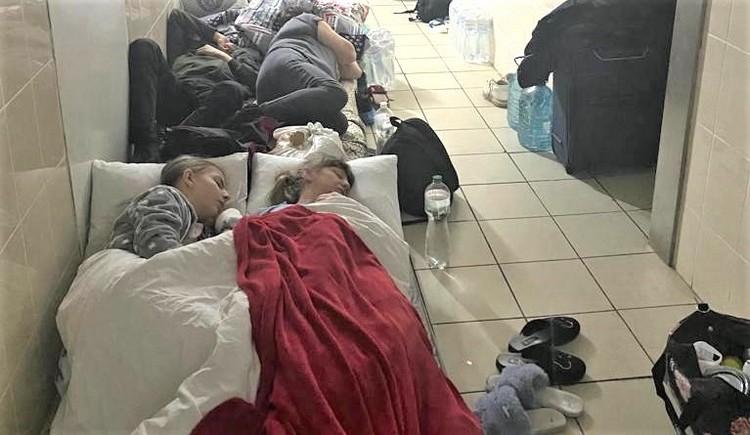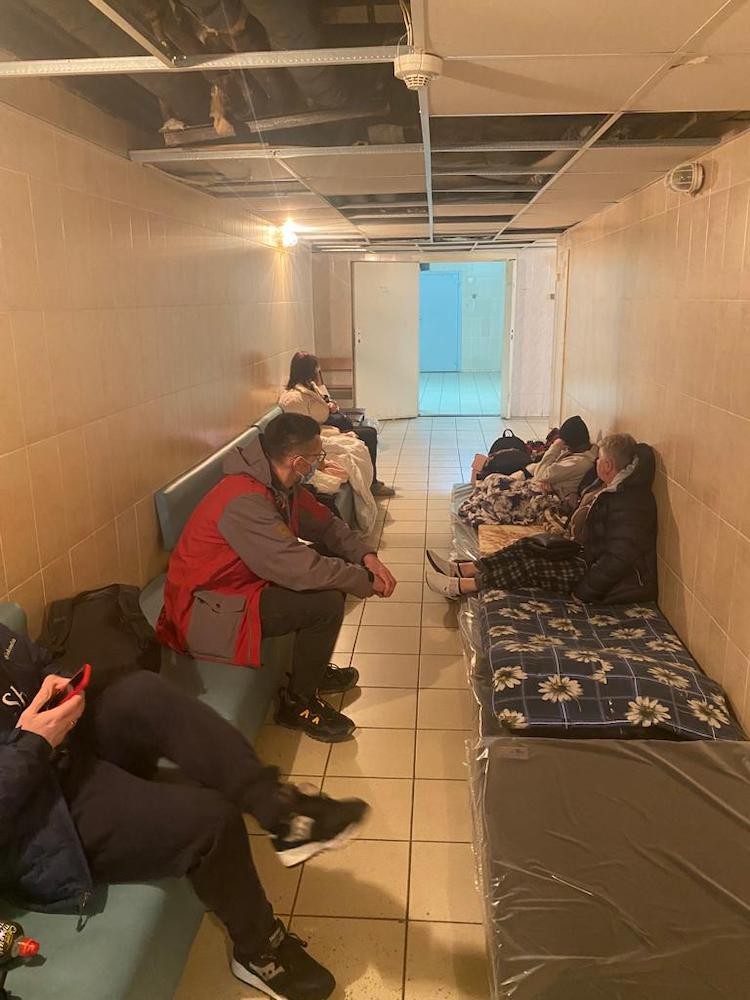Cancer care in Ukraine, one year on

Power cuts and shortages of medicines. These are the biggest challenges for oncology services in Ukraine. One year after the Russian invasion, Agnieszka Witkowicz-Matolicz asks a Kyiv-based patient advocate and the head of the Ukrainian Society of Medical Oncology about the impact on patients and those who provide their care.
I make two appointments to speak to Anna Uzlova of Inspiration Family, a Kyiv-based foundation set up in September 2020 to support adult cancer patients. The first time the interview cannot take place because Uzlova is going to visit family out of the city. She texts me that “according to the schedule there will be no electricity”, which means no way to communicate at all, even by mobile. How is cancer care carried out in such conditions, I wonder. I have the opportunity to ask the following day.
“How are you?” I start the conversation when we connect. Uzlova replies with an uncertain smile. Her expression makes me realise how misplaced my routine question is. A missile alert is in force all morning in Kyiv. This is something one cannot get used to.
When we start talking I begin to understand how far the situation for cancer patients in Ukraine has changed from the early days of the full-scale Russian invasion, a year ago.
“There was a huge amount of uncertainty at the beginning. We didn’t know what was going on. Whether patients would be allowed to continue treatment at all, if so in what form. We also had a huge wave of migration. People, including oncology patients, were leaving Ukraine, seeking refuge and help in neighbouring countries or migrating to the west of Ukraine,” Uzlova recalls.
Andriy Beznosenko, Chief Medical Officer at the National Cancer Institute in Kyiv, recalls that at the very beginning of the war his hospital had to cope with unplanned power cuts after every shelling, almost every day. “Doctors had to finish operations using headlamps and manually ventilate the lungs of patients,” he said.
When the Russian forces were pushed back from the Kyiv, Chernihiv and Sumy area everything got more stable. Some cancer centres started to work again. “Now our patients can get the whole treatment cycle in Ukraine in safer areas,” says Uzlova. “We provide medical help for every patient with cancer we get here,” adds Beznosenko.
However, as Uzlova points out, cancer care in Ukraine is still far from what it should be. “I always say that the war highlighted all the problems we had before.” And it added new ones. Medical supply shortages top the list.
At the start of the war humanitarian aid was helpful: “Even some innovative and expensive drugs were provided. Now it has stopped; now this has become much less,” says Uzlova. Today there are significant shortages of anticancer drugs, medical devices, materials and surgical equipment, all of which are needed to provide specialised medical care. “We have a lot of gaps. They concern not only very expensive drugs, but also basic,” says Uzlova.
If something is not available in the hospital, patients have to buy it themselves, often abroad. “There were cases when patients refused to get treatment as the price of medications and supplies were too high for them,” Beznosenko admits.
“Sometimes patients have to travel to another centre in search of a medicine and continue their treatment there”
It is not just a matter of money. It is also a matter of logistics. It’s difficult to shift medicines between hospitals. Those that are low on stocks do not share willingly, for fear that they will not be able to make up the shortfall later. Drug shortages increase medical migration. “Sometimes patients have to travel to another centre in search of a medicine and continue their treatment there,” says Uzlova.
Medical migration is a key word. At the beginning of the war, patients headed mainly to neighbouring countries. Today, this is no longer the case, even though the bureaucracy associated with such journeys has been simplified. Inspiration Family helps its patients with medical evacuation. However, that option involves its own challenges: “In the nearest country, Poland, there is a huge problem with accommodation,” Uzlova acknowledges. Another problem is the waiting times. “We know it’s normal also for [Polish] citizens, but our patients are already delaying their treatment in Ukraine. When the additional delay caused by queues is added to this – the loss of time becomes large. It may not be the best decision.”
Ongoing heavy fighting in the east of the country has led many patients to seek a safe medical haven in Kyiv. “Today, about 80% of patients we get, come from the occupied and front-line regions,” says Beznosenko. Two large cancer hospitals are under occupation with no staff, electricity and any medical supplies. Members of the Inspiration Family tried to contact their patients from occupied regions. Unsuccessfully. They managed to establish a connection with a doctor from Kherson, when Kherson was occupied. “We know that there were some Russian drugs that patients had to pay for. We don’t know what they were, or what the quality of those drugs was – whether, for instance, they had been delivered under proper temperature control.”
Two regional cancer treatment centres, which were under occupation for a long time, have recently started work, but they still get a very small number of patients. A lot of hospitals were completely or partly destroyed, so medical help is impossible there.
That is why patients are generally recommended to seek treatment in Kyiv, Cherkasy or Lviv. Because of internal migration, all cancer hospitals in the western and central parts of Ukraine have a two- to three-fold increase in patient flow, which leads to waiting times for treatment of up to three to four weeks. “Ukrainian patients are mainly waiting for surgery and radiation therapy. The intensity of doctors’ work has increased several times,” Beznosenko concedes.

Medical migration from occupied and frontline regions is increasing waiting times at Kyiv’s National Cancer Institute, despite heroic efforts by medical staff to cope with added workload
Images courtesy of Andriy Beznosenko
Some patients choose instead to stay at home. “They have their flats there, it’s important for them. It is not easy to find accommodation in Kyiv. We do not have an internal immigration support system. Our government has introduced a programme for internal refugees, but it’s not enough,” says Uzlova.
“Today, about 80% of patients we get, come from the occupied and front-line regions”
Periodic rocket attacks also impact on waiting times. “During air alerts, hospitals stop providing planned medical care, which affects the queues for specialised treatment as well as the psychological state of patients and medical staff,” says Beznosenko. The damage inflicted by the attacks also result in interruptions to electricity, heating, water supply and sewerage, though the country’s hospitals are much better prepared for power cuts today than they were a year ago. They are included in the country’s list of ‘critical infrastructure’, and have been provided with diesel generators and autonomous thermal boilers. “There are no problems with electricity and heat. However, when Russian rockets hit water distribution stations, medical institutions are forced to keep working without water supply and proper sewerage,” says Beznosenko, though he emphasises that this does not require them to adapt patient treatment plans, though it can slightly disrupt the timing of care delivery.
On top of all these obstacles and pressures, doctors note that, since the Covid 19 pandemic, patients have been presenting at a more advanced stage of the disease. And despite added workload, says Beznosenko, physicians are routinely spending more time with patients face to face than they used to, because of the psychological state of patients and their relatives, under stress from both the disease and the war. The emotional toll is showing itself in increased rates and intensity of burnout among medical staff, he says.
“And as the war continues, these problems and barriers will only get worse. But we believe and we are confident in the victory of Ukraine and our nation”.